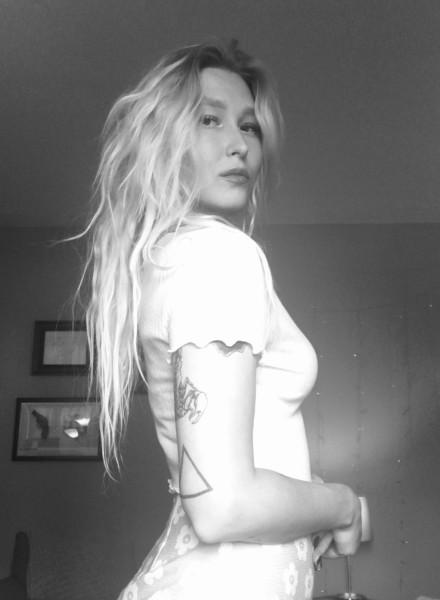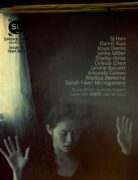Your timeline is interesting to me. You almost could have written the incidents out on 3×5 cards and shifted them around for a bit to find the right way of telling this. What was the process like for deciding how to tell this?
I actually came to this structure through a hermit-crab prompt from Tyler Mills. She asked us to consider a memory we had that was “too embarrassing to talk about” and craft a one-sentence essay from it. This piece, surprisingly, never felt “out of order” time-wise, even in its early stages. Since this essay hinges quite heavily on control (or the lack of it), I wanted to elicit breathlessness in my reader to mirror the speaker’s body as it grew increasingly panicked. In order to maintain a form that promoted that, I found it easiest to move chronologically, with reflective pulls into the past between stanzas—if we’re to call them that.
I’m from Appalachia, too. Why is it that every other place and its people seem … off or something?
Ugh, I love that you get this! When I first moved to Oklahoma from West Virginia, I was immediately rattled by the lack of trees, hills, flora spilling from everywhere. I drove in with my sister during a lightning storm and the open expanse felt both starved and desolate. The bareness was startling. I, too, when outside Appalachia, feel laid bare—vulnerable. Appalachia is a place marked by unknowns. While the unknown can be fearful, I think those who grew up in that region can find comfort in knowing the land while being cloaked by it. And to be fair, the guy in this essay was quite lovely. When I told him I was writing this, he was like “I get it! I hope it gets published!” Like Appalachia, there’s a strange communal kindness present in this region that feels very much like home.
The danger in this story is so provocative, and it’s made more lethal through imagery (horsetails “like bone popping out of place”). Do I smell a fellow poet? How do you know when it’s a poem and when it’s a fiction? And let’s not even bring nonfiction into this.
I’m reluctant to claim genre in anything I write. But of course, that’s a lie. I lean towards CNF simply because I’m supposed to publish in it if I want to land a job after I get done with my degree. But I think prose that plays with and rejects formal constraints tends to reveal something truer than those relying on traditional rules. When a poem, story, or essay moves us, we never stop to think about whether our feelings about it are true. And besides, genre-benders are a form of resistance! Why not fuse elements from all artistic modes that strike the heart? Whatever possesses us (in a poem, piece of prose, song, reality TV show, etc.) says something about our hidden wants and fears. Sound and image don’t lie. Our feelings about memories don’t lie either—even if what we remember shifts through time, distance, perspective. What better place to refuse writerly rules than a piece that considers control, the female body, desire?
Actually, after I wrote that last question, I looked you up. You’re primarily a nonfiction writer, it turns out! Why are you so scared of commitment?
Ha! What do you mean by commitment? To a genre or to a person? Listen, if I could answer that, I wouldn’t be in a PhD program or therapy. All jokes aside, I like to think the only commitment I need to make at this point in my life is to that of my writing. That sounds so tacky, but whatever. I keep craft moves that I’m smitten with in every “genre” and learn from that which doesn’t serve me.
I see that you’re nonfiction editor for Into the Void. What does editing do for you as a writer, besides suck up tons of time?
Well, Into the Void actually closed up shop this past year. The work we’ve put out is beautiful and compelling; I’m proud to have watched such talented artists build a platform got to work for. I don’t love editing, but I do know it’s part of our practice. If I said I don’t unearth most of my most poignant prose through the process of editing, I’d be a liar. I do what’s necessary, as do we all. It isn’t lost time when you’re finding out something new about your work, self, or the world at large, is it? Apparently it’s cliche-o-clock out here in the southwest. I wonder what time it is back home.



 The SmokeLong Grand Micro Contest (The Mikey) is now an annual competition celebrating and compensating the best micro fiction and nonfiction online.
The SmokeLong Grand Micro Contest (The Mikey) is now an annual competition celebrating and compensating the best micro fiction and nonfiction online.